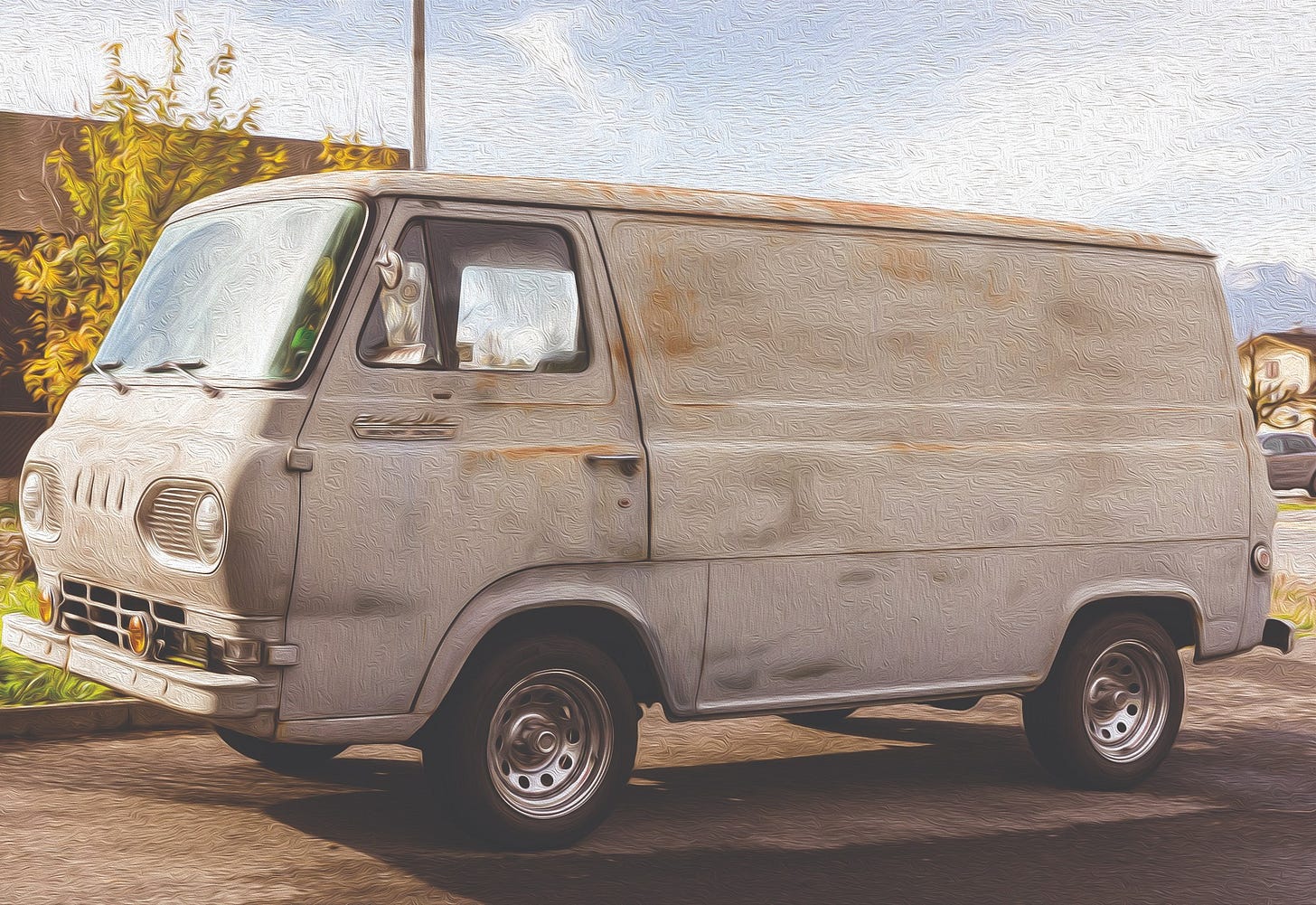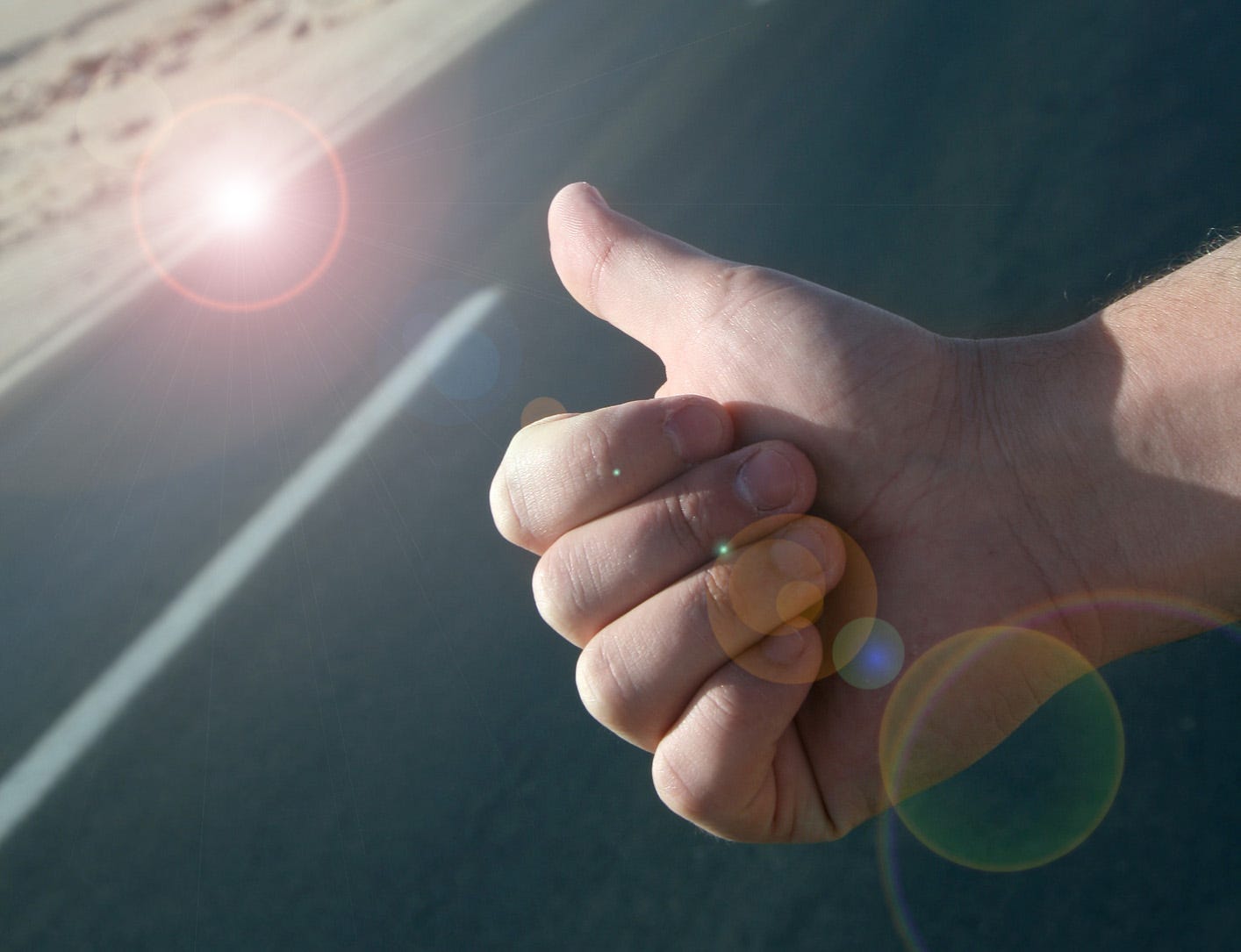The Blues & Billie Armstrong 23
NOT IN THE BIBLICAL SENSE
Previously in The Blues & Billie Armstrong…
She held up her hitchhiking thumb. “I got the key to the highway right here,” she said, a nod to one of our favorite cuts from the stack of 45s on the Grundig. And with a grin, she added, “Archer, you are a pessimist, a cynic, a killjoy,”
“I prefer skeptic,” I said.
Billie girl-talked the attendant at the Texaco station out of a free-with-a-fill-up Lupoyoma County map, then we walked out of town while she lectured me on the rudiments of hitchhiking etiquette.
Hold your thumb this way, don’t turn your back on the cars, look the drivers in the eye with a friendly, open face.
I was nervous as a kid stepping up to the plate in his first Little League game, fidgeting with my hair and rocking foot to foot in the roadside dirt. Billie misunderstood my anxiety. “Don’t worry, we’ll get a ride.”
“Yeah, hopefully before a cop shows up and we’re arrested for vagrancy. Or worse, someone from town sees us and tells my father I’m standing on the side of the road like a hobo.”
“Or…” she held up an instructive finger, “some Charles Manson weirdo might come along with a bus full of hippie girls and brainwash you with religion and drugs and group sex.”
I fought off a laugh. “It could happen.”
“You wish.”
I relaxed a little and, when a few cars came by I tried out my hitchhiking stance, which Billie also found hilarious, barking directions and shaking her head at my awkward attempts. “Stand up straight… not that straight… oh my god, bend your elbow… and stop bouncing!”
Before long a jalopy-looking Ford Econoline came rushing toward us, filthy white, splattered here and there with blotches of rust and primer, the horn honking as it sped by. The van gradually slowed and pulled over to the side, raising a cloud of dust and rocks, until it finally smoked and skidded to a stop fifty yards past us. The passenger door swung open as we jogged up beside the van. A pushing-thirtyish man with no shirt, striped bellbottoms and a frizzy perm like Art Garfunkel sat in the driver’s seat, a beer can between his legs.
“Only going up to Parker’s Junkyard,” he said, and we climbed in the van without knowing how far away Parker’s Junkyard was, or how close to our goal.
Soon we saw it in the distance—crumpled automobiles stacked up and tottering over a faded tin fence—and Garfunkel started pumping the brakes. They finally grabbed just barely in time. Smoke rolled off the tires with the stink of burnt rubber. Gravel flew into the air and rained back to the asphalt. Billie braced herself with both hands on the dash, and I held on to the back seat. For a moment I thought we wouldn’t stop. When we did, Garfunkel took a slug of beer, wiped his brow and looked over with a sheepish yellow smile. “Needs new brakes,” he said.
We said our thank yous and jumped out to safety.
“Well, that’s one way to break your hitchhiking cherry,” Billie said.
We were at a crossroads, a dusty four corners of businesses that seemed content to be out of the way of modern progress. Parker’s Junkyard, a beer-and-bait shack called Sam’s, a fruit stand that was actually just a table and two chairs next to a cardboard sign that promised “strawberry’s and pare’s” and something called The Bus Stop Antiques & Treasures. According to the street signs, these establishments were gathered at the intersection of the highway and Rawson Road.
“See,” Billie said. “Sometimes you gotta believe in what you want.” As if that somehow explained our dumb luck—to have survived Econoline Garfunkel’s brakes, much less to be somewhere in the neighborhood of our destination.
“We still don’t know how far it is to 1425,” I said.
She rolled her eyes at my defeatist attitude and started walking up Rawson Road. I followed. She stopped in a turnout and stood in the blonde dirt with her thumb out, even though there were no cars. I kicked rocks with my tennis shoes. Puffs of pale dust rose into the air around my feet like miniature atom bomb clouds. The sun scaled the sky. From the junkyard, the smell of leaked oil and gas reached us along with the winding sound of a forklift shifting gears.
In the space of an hour, a total of three cars turned down Rawson Road, and none of them stopped to offer us a ride. Meanwhile Billie talked of her travels and wisecracked how Lupoyoma County was about the worst place she’d ever hitchhiked in her long career, how she’d actually been at Woodstock and thumbed there all the way from Ohio in less time than it would probably take us to get to 1425 Rawson Road and back.
“Thought you had a plan,” I said. “Key to the highway, right?” And I started walking. I was never a sarcastic person until I started hanging around Billie, and that’s the truth.
This time, she followed me. Maybe we only walked a couple miles on that flat one-lane road but it felt like seven—trudging forward, bent in stubbornness, with the noon sun on our backs and oil stains shimmering on the asphalt.
Eventually we spotted a three-story Victorian set back from the main road, up a quarter mile of dirt driveway on a rounded hill that rose from the otherwise gentle valley floor. Exposed in the glare of the high sun, it had the look of a haunted house movie set, graying and cadaverous atop its perfect hill, watching the road through broken-glass eyes, a tongue of crumbling stairs lulling out of its double-door mouth.
Where the long driveway met Rawson Road, it was blocked by a metal gate secured with thick industrial chains and huge rusting padlocks. A dented mailbox dangled from a wooden post, only vaguely attached—a solid triple in some past game of mailbox baseball. Billie turned it around to check the street number. “This is it.”
We could’ve climbed over the gate, but there was no way to walk up that driveway or across the bare hill without being seen. Some nosy neighbor would drive by and call the police, Billie would go back to juvey, and I’d be worked and churched for the rest of my teenage days. The place looked empty anyway, deserted, my mother still a house I couldn’t enter.
The walk back toward the highway was hot and quiet. I lagged behind Billie and kicked a rock out ahead of me so I could kick it again. And again.
“Not enough cars here,” Billie muttered up ahead. “Not enough cars, not enough people, not enough cool people anyway, this place is gonna drive me crazy. I can't wait to get out of here.”
“Where else would you go?”
“Someplace where people aren’t on your case if you don’t fit in. People like your father and my mother. Or your grandmother—did you know she offered to take me shopping, said the store on Main Street has some new summer dresses… in the chubby section. That’s right. Well, I don’t want to squeeze myself into pretty clothes for Granny Junia or my mom or whoever. I don't want to be pretty. I want to be an artist. I don’t want to live my life pretending to be someone else, man. I mean, look what happened to your mom.”
I figured I was too young (and too male) to understand. Was my mother pretending to be someone else? Was that the why behind the pills and the vodka? Wasn’t having an affair also pretending? And what was so terrible about the chubby section at Snider’s Clothing? Were we even talking about clothes?
Pop once told me that a man becomes a better man when he really knows a woman. Not in the Biblical sense, he said, and not in the way some people have of learning your soft spot for their own advantage, but a deeper way of knowing that Pop said was like seeing things through another person’s eyes.
“Like a meeting of the minds?” I said, because I’d read that phrase somewhere and thought it hinted at something important.
“Like a meeting of hearts,” Pop said.
I didn’t think I would ever know a woman that way.

The Blues & Billie Armstrong is a work of fiction. Names, characters, businesses, places, events and incidents in this book are either the product of the author's imagination or used in a fictitious manner. Any resemblance of the fictional characters to actual persons, living or dead, is purely coincidental.
© All Rights Reserved


